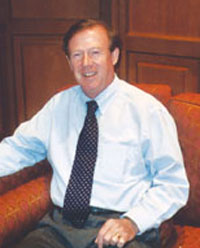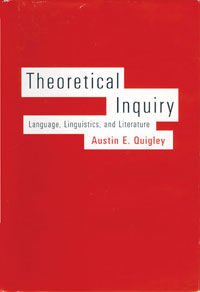|
|
 |
 |
 |
 |
|
BOOKSHELFDean Quigley on Theoretical Inquiry
Specializing in literary theory, modern linguistics, theatre and drama (particularly Harold Pinter), Dean of Columbia College Austin E. Quigley has published many scholarly articles as well as the books The Modern Stage and Other Worlds (Routledge, 1985) and The Pinter Problem (Princeton University, 1975). His latest book looks more broadly at the instruments and practices of scholarship in the humanities. In Theoretical Inquiry: Language, Linguistics, and Literature (Yale University Press, 2004), Quigley examines the recently popular role of the theorist and its relationship to the roles of critics and historians, noting that theory has often reduced literature to illustrating a theory’s presuppositions. It is surprising, he notes, how readily theoretical instruments of inquiry degenerate into instruments of ideology. “If a theory is to be useful in the humanities, it has to
serve to illuminate what it does not presuppose,” Quigley
says. “Otherwise, the theory actually ends up limiting the
meaning of a work of imaginative literature.” But a question
then arises whether the theory, in encountering something it does
not presuppose, has thus been falsified. And that question raises
further questions about the adequacy of our understanding of the
nature and role of theory. Quigley’s interest in the study of language has continued since his days in Birmingham, leading him to continually explore how language works in literature and in linguistic and literary theory. Beginning with a general discussion of the theory movement in the humanities and social sciences, the book then delves into analyses of the work of linguists and philosophers of language such as Saussure, Firth, Bakhtin, Chomsky, Halliday and Wittgenstein, noting the parallel concerns of linguistic theorists and those in the realms of literary and cultural studies. “Modern linguistics has tended to study language as series of isolated sentences, as opposed to studying sentences interacting in dialogue,” says Quigley. “There is a question of how language works in general, and then how it works in literature and subspecies of literature, particularly the drama.” He points out that current questions of how language works, of how to decide what a text means, and of who has the right to decide reflect ancient scholarly debates. “It’s a discussion that has been going on for more than 2,000 years with little advancement upon early arguments. The questions and answers of today go back at least as far as Plato and the Sophists and are repeated with ingenious variants in one era after another.” Considering language in the context of the drama points the way forward, Quigley believes. Arriving at Columbia in 1990, Quigley took primary responsibility for creating the undergraduate drama and theatre arts major, restored the Ph.D. program in theatre and helped revitalize the School of the Arts theatre programs. He went on to chair the Lionel Trilling Seminars and now serves as dean and Lucy G. Moses Professor. Linking his interests in language, the drama, literature in general and cultural studies more broadly, Quigley wrote drafts of Theoretical Inquiry before becoming dean of the College in 1995, then revised the work steadily during the past 10 years. “It’s a career-long reflection on the challenges facing the disciplines I work in,” Quigley says. “How do you decide the meaning and status of a text, and who decides?” In the simplest terms, “We have a picture of how to interpret a work of literature — we put it in a context; that of a historical era, a critical framework or a theoretical model,” Quigley explains. “The questions that are not asked so much are ‘In what context should theory be interpreted? What sorts of relationships does it have to the data it confronts?’ Because we are not clear on these matters, we keep stumbling over presuppositions that narrow the ways we think.” Hence the importance of expanding our understanding by thinking of literature as including drama, and not just the novel and poetry.
“The questions asked about poetry and the novel are best approached if interrelated with drama,” Quigley says. “A good dramatic performance, at its best, takes on a life of its own beyond what you conceptualize in advance. Successful performance involves constant renewal, not merely revival and repetition. In the same way, interpretation should be a means of access to an experience that is larger and other than the presuppositions embedded in our instruments and practices of inquiry. It should provide a means of enlarging our understanding, of surprising us, not of merely illustrating our presuppositions and prior concerns, however important they may be. But this means we must consider carefully how we relate the roles of theorists historians and cultural critics. Before coming to Columbia, Quigley was chair of the University of Virginia English department, and he has taught at the University of Massachusetts, the University of Geneva, Switzerland, the University of Konstanz, Germany, and the University of Nottingham, England. He has served as president of the National Association of Literary Scholars and Critics as well as being on the editorial boards of various scholarly publications. In the future, Quigley hopes to continue exploring new arenas, with ideas for books about postmodernism in the drama and about undergraduate education in the contemporary world. Laura Butchy
|
|
|||||||||||||||||||||||||||||||||||||||||||||||||||||||||||||||

